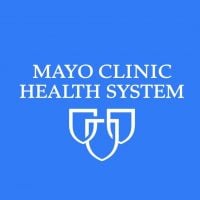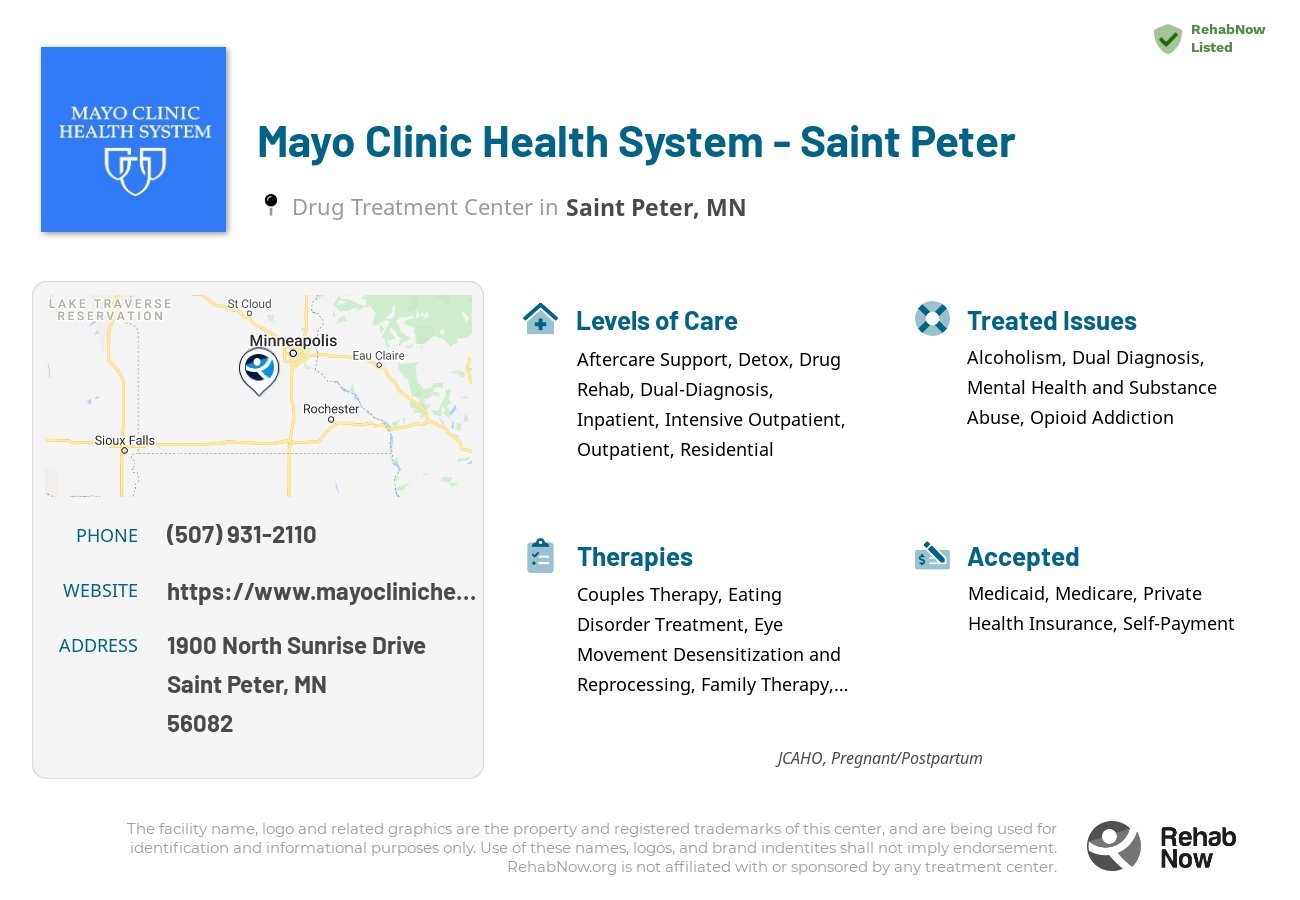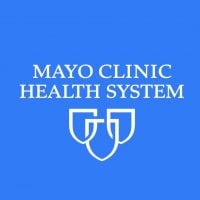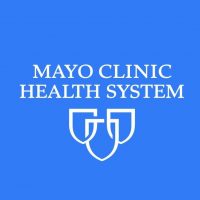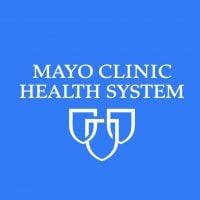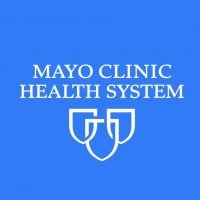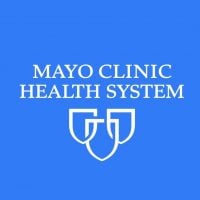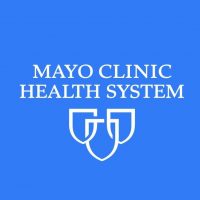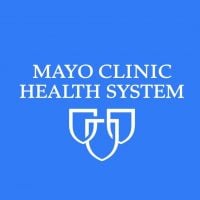About Mayo Clinic Health System - Saint Peter in Minnesota
Mayo Clinic Health System - Saint Peter is a comprehensive outpatient treatment facility located in Saint Peter, Minnesota. It provides a wide range of services to individuals, couples, and families throughout the region. The team at Mayo Clinic Health System - Saint Peter is highly experienced and committed to providing individualized, quality care to those struggling with addiction and substance abuse. They provide both traditional and alternative therapies, allowing each individual to receive the treatment that best suits their individual needs.
Mayo Clinic Health System - Saint Peter offers a variety of treatments for addiction and substance abuse. From detox and stabilization, to individual therapy and relapse prevention, their multidisciplinary team provides evidence-based treatment that can help individuals achieve lasting recovery. Dual diagnosis treatment is also available for those with co-occurring mental health disorders, and family therapy is available to help the family gain skills and support to aid the recovering individual. Support groups and the 12-Step Model are also offered for peer-support.
At Mayo Clinic Health System - Saint Peter, they understand the importance of providing quality care, and have a number of accreditations and licenses to show that they meet the highest standards. They are CARF-accredited and have received the Joint Commission Gold Seal of Approval, as well as various recognitions from the Minnesota Department of Human Services. Additionally, they offer specialized programs such as an Intensive Outpatient Program (IOP) and a 3-week day treatment program. With all these offerings, Mayo Clinic Health System - Saint Peter is dedicated to helping people affected by addiction and substance abuse in the Saint Peter, Minnesota area.
Genders
Ages
Modality
Additional
Accreditations

JCAHO
Conditions and Issues Treated
Opioid addiction has become a significant health problem in the United States. When a person’s life becomes unmanageable because of an opioid addiction, treatment can help them get sober. Treatment includes medical care and counseling.
“With so many people struggling with opioid addiction, we need more care and attention for those who want to quit. Opioid addicts often take opioids when they experience a painful injury – that’s how the cycle starts! When someone begins taking their medication differently than prescribed or takes an excessive amount of drugs, it means they’re hooked on drugs and in danger of overdosing.
The most successful way to beat this is through detoxing from these types treatments at Mayo Clinic Health System - Saint Peter in . Most facilities start by using medical support during the process while providing counseling services; rehabilitation comes later on after treatment has been completed successfully.
A “dual diagnosis” is when the individual has two medical issues at the same time. The top co-occurring mental disorders with addiction are depression, anxiety, ADHD, bi-polar disorder. Addiction is also considered a mental illness that is not a choice but rather a medical condition. Addiction can be caused by any number of underlying issues.
Dual diagnosis is provided by Mayo Clinic Health System - Saint Peter to treat addictive tendencies as well as any untreated mental illnesses. This ensures successful long term health and recovery for patients after treatment has been completed.
Dual diagnosis is provided by Mayo Clinic Health System - Saint Peter to treat addictive tendencies as well as any untreated mental illnesses for people in Minnesota. This ensures successful long term health and recovery for patients after treatment has been completed.Levels of Care Offered
This center offers a variety of custom treatment tailored to individual recovery. Currently available are Aftercare Support, Detox, Drug Rehab, Dual-Diagnosis, Inpatient, Intensive Outpatient, Outpatient, Residential, with additional therapies available as listed below.
The first level of recovery is detox. It involves giving a person the opportunity to get the toxins out of their body safely. The individual receiving treatment at Mayo Clinic Health System - Saint Peter typically will get ill during detox, and they will often start using again to get rid of unpleasant emotions and complicated physical responses. It is why having a Minnesota medical professional present is so critical. A medical professional can make sure that patients do not start using again during detox and stay physically healthy during the process. They will also have treatment on a mental level to relieve their symptoms and guide them through the process.
Going to an inpatient rehab facility means living there while all aspects of addiction or co-occurring disorder get addressed. The treatment involves medical supervision, therapy, and future planning.
This type of rehabilitation provides a drug-free environment for people who struggle with chronic/long-term addiction without having access to drugs outside the center (or their own home). It takes away any distractions because they live there 24 hours per day. If someone is trying to break out old habits, which could lead them back into substance abuse, things like jobs or school can be put on hold until after they complete their stay to focus solely on recovery.
Outpatient addiction treatment is beneficial for people who are able to function well in their day-to-day lives. It is recommended for people who are not yet ready to end their relationships with friends or family members who might be encouraging drug and alcohol use.
Intensive outpatient treatment is beneficial for:
- People who are able to attend treatment more than 3 times per week.
- People who do not meet the criteria for inpatient treatment.
- People who are able to contribute to their own recovery outside of the treatment center.
- People who are motivated towards recovery.
- People who are able to overcome addiction on their own without the need for higher levels of care.
Outpatient programs at Mayo Clinic Health System - Saint Peter, the Saint Peter resident can live with their family while continuing with their job or studies. Treatment includes educating the patient on drug abuse, medications, and counseling sessions at the individual or group level. Outpatient treatment plans cover diagnosis, detoxification, management, and counseling. They are a popular option for those who have graduated from inpatient facilities.
Residential treatment programs are those that offer housing and meals in addition to substance abuse treatment. Rehab facilities that offer residential treatment allow patients to focus solely on recovery, in an environment totally separate from their lives. Some rehab centers specialize in short-term residential treatment (a few days to a week or two), while others solely provide treatment on a long-term basis (several weeks to months). Some offer both, and tailor treatment to the patient’s individual requirements.
Without aftercare support, addicts can easily relapse back into addiction. It is crucial to integrate the addict back into society. Aftercare support should take place after outpatient treatment has ended.
There are a few different types of aftercare support that patients can seek after completing an inpatient treatment program:
- 12 Step Self-help groups (AA, NA)
- Therapeutic communities,
- Long-term, structured sober living arrangements
- Halfway houses (residential treatment centers)
Many different support groups exist for addicts to seek help after treatment. Some are more effective than others, depending on the person’s addiction, background, and other factors.
Therapies & Programs
Individual therapy is a form of counseling where you meet with a trained professional one-on-one. Meeting with a therapist in this setting allows for a personal and trusting relationship to be built. This allows the patient to open up about sensitive or private issues they may not feel comfortable discussing in a group. Individual therapy helps identify the root causes of your addiction, which can help prevent relapse.
Couples therapy for drug addiction is a unique form of therapy that allows family members to work through the emotional issues of their loved one’s addiction together. Family members can support each other while learning how to cope with the addiction and encourage healthy changes. The two will work with a therapist to learn how the addiction affects themselves and the relationship.
Family therapy is often done alongside drug treatment to help addicts stay sober. The goal of family therapy for drug addiction is to create an environment where communication can happen without judgment, hostility, or blame. The therapist will sit with the family so they can learn how to communicate differently and provide new tools for dealing with emotions so that people don’t want to drink or do drugs. It’s important for families to focus on relapse prevention plans during treatment so that if the addict feels like they want to use again, they’ll know what steps they need to take together to prevent it from happening again in the future.
Group therapy sessions are another common addiction recovery service. These group sessions typically involve six to 12 addicts who meet regularly with a trained professional for support and guidance.
During these sessions, the group shares their experiences with one another and provides feedback that can help each member avoid relapse or overcome specific obstacles they are facing in their recovery process. With this type of support and guidance, addicts can feel like they are part of a community that understands their struggles and will help them get through the hard times.
Many people struggling with drug addiction have experienced some form of trauma in their lives. It is crucial that these individuals seek out professional help; otherwise, their drug abuse and addiction will likely continue.
Therapists and counselors at drug treatment centers employ several treatment programs to help people struggling with drug addiction, including trauma therapy. Trauma therapy helps people dealing with addiction by allowing them to confront the traumas of their past and move past them.
It is important to note that trauma therapy should not be confused with PTSD (post-traumatic stress disorder). Rather, it is used to treat the effects of trauma, which are often at the root of addiction.
Cognitive Behavioral Therapy (CBT) focuses on the underlying thoughts and behaviors that caused the problem of addiction in the first place and may cause a relapse. Negative feelings are common in drug abuse disorders, but they can lead to co-occurring disorders if not recognized. CBT involves strategies that help to change the behavior pattern by restructuring negative thoughts into positive ones. It helps to remove these feelings, and it provides long-term benefits. Also, CBT promotes self-awareness and self-control. It can be administered as a monotherapy or as part of combination therapy.
CBT can improve the patient’s mood, reduce drug cravings and boost success rates on treatment plans. Regular practice can help individuals handle negative attitudes, thoughts, and feelings without turning to drugs or alcohol. The core belief of Cognitive Behavioral Therapy (CBT) is that one’s moods, behaviors, and actions are all connected. Individuals can improve their quality of life using CBT. It helps addicts understand the patterns of thought and feelings that cause them to use drugs or alcohol and develop a healthy response.
Eye Movement Desensitization and Reprocessing (EMDR) therapy is a treatment method that helps reduce the impact of traumatic memories on individuals. It involves following a bar of light or watching a therapist’s finger move back and forth. This mimics the eye movements of REM sleep, which allows the brain to reprocess memories. EMDR therapy is combined with behavioral therapies to address the root cause of the problem. This reduces the desire to escape painful memories with drugs.
EMDR can be helpful for people who turn to drugs to escape traumatic events. It is a treatment that reduces the impact these memories have on emotions. Individuals who suffer from negative feelings associated with a traumatic experience can find relief in EMDR therapy. This treatment is combined with behavioral therapies. Patients follow a bar of light throughout the session or watch their therapist’s finger move back and forth. These rapid eye movements reduce feelings of negativity and promote calmness and relaxation. This minimizes the impact traumatic memories have on emotions, reducing the desire to escape painful memories with drugs.
It’s not as simple as quitting drinking or using drugs and expecting the hard part to be over. Many addicts in recovery have discovered that they need to improve skills such as time management, organization, communication, socialization, and self-esteem. Learning certain life skills can help those who are struggling with addiction.
Medical nutrition therapy for addiction helps patients at Mayo Clinic Health System - Saint Peter avoid “trigger” foods. Someone who craves alcohol may be sugar addicted. Eating a balanced diet with adequate protein, vegetables, and fruit can help reduce drinking urges.
MNT is a type of addiction treatment that teaches patients about healthy eating habits while counseling them. These sessions include meal planning, cooking demonstrations, shopping tips, grocery store tours, and food education.
Nicotine replacement therapy is a drug treatment that allows people to get the effects of nicotine without chewing or smoking. The therapy is often done with a patch, and doses of nicotine are reduced until nicotine is no longer needed. NRT helps smokers get nicotine into their system without resorting to smoking, and it has been shown to be an effective way to help people quit smoking. Coupling NRT with counseling and other means of support gives long-term smokers a better chance of removing their unhealthy habit.
Payment Options Accepted
For specific insurance or payment methods please contact us.
Is your insurance accepted?
Ask an expert, call (888) 674-0062
Mayo Clinic Health System Associated Centers
Discover treatment facilities under the same provider.
- Mayo Clinic Health System - Eau Claire in Eau Claire, WI
- Mayo Clinic Health System - Eastridge Clinic in Mankato, MN
- Mayo Clinic Health System - Owatonna in Owatonna, MN
- Mayo Clinic Health System - Belle Plaine in Belle Plaine, MN
- Mayo Clinic Health System - Fairmont in Fairmont, MN
Learn More About Mayo Clinic Health System Centers
Additional Details
Specifics, location, and helpful extra information.
Saint Peter, Minnesota 56082 Phone Number(507) 931-2110 Meta DetailsUpdated November 25, 2023
Staff Verified
Mayo Clinic Health System - Saint Peter Patient Reviews
There are no reviews yet. Be the first one to write one.
Saint Peter, Minnesota Addiction Information
Minnesota is fighting an opioid epidemic that is leaving hundreds of its residents dead each year. Both prescription opioids and illicit opioids are widely abused in the Land of 10,000 Lakes. Heroin continues to be one of the most commonly abused drugs in the state, if not the most common illicit drug. Over 10% of all treatment admissions in Minnesota list heroin as their drug of choice.
9,000 people in Saint Peter struggle with drug addiction and this number continues to grow. In 2016, there were 1,521 reported drug overdose cases in the state. That number has been rising steadily over the past few years. There are many different types of drugs being abused in Saint Peter. The most common ones include heroin, cocaine, methamphetamine, and prescription drugs.
Treatment in Nearby Cities
- Long Prairie, MN (120.5 mi.)
- North Branch, MN (93.4 mi.)
- Sandstone, MN (134.3 mi.)
- Rochester, MN (77.6 mi.)
- Virginia, MN (230.0 mi.)
Centers near Mayo Clinic Health System - Saint Peter
The facility name, logo and brand are the property and registered trademarks of Mayo Clinic Health System - Saint Peter, and are being used for identification and informational purposes only. Use of these names, logos and brands shall not imply endorsement. RehabNow.org is not affiliated with or sponsored by Mayo Clinic Health System - Saint Peter.
